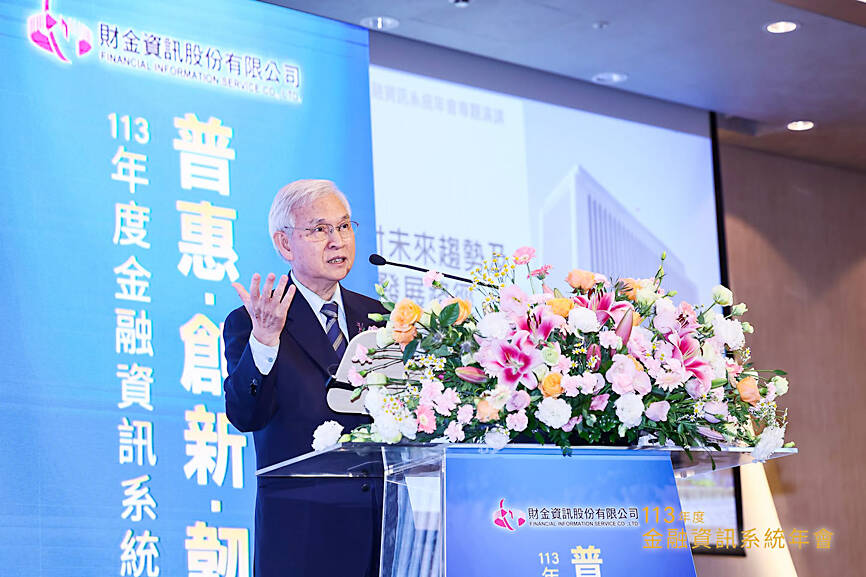Taiwan would remain in the same international network for carrying out cross-border payments and would not be marginalized on the world stage, despite jostling among international powers, central bank Governor Yang Chin-long (楊金龍) said yesterday.
Yang made the remarks during a speech at an annual event organized by Financial Information Service Co (財金資訊), which oversees Taiwan’s banking, payment and settlement systems.
“The US dollar will remain the world’s major cross-border payment tool, given its high liquidity, legality and safe-haven status,” Yang said.

Photo: Chen Mei-ying, Taipei Times
Russia is pushing for a new cross-border payment system and highlighted the issue during a BRICS summit in October.
The existing system — the Society for Worldwide Interbank Financial Telecommunication (SWIFT) — is a cooperative established in 1973 in Belgium and owned by the banks and other member firms that use its service.
SWIFT’s coverage has grown increasingly more extensive and gained a competitive edge, helped by the Internet, Yang said.
Today, about 11,000 financial institutions in more than 200 countries are part of the SWIFT network, making it the backbone of international financial information transmission.
The SWIFT network neither transfers funds, nor is it a banking system. Rather, it sends payment orders between banks using SWIFT codes, he said.
Global transactions amounted to US$271.37 trillion in the first three quarters of this year, with the US dollar being the primary clearing currency, accounting for 47.5 percent, Yang said, citing SWIFT data.
Any uses in contravention of EU or Belgian regulations would be sanctioned after being reported to the SWIFT board. Serious contraveners might be cut off from the system, Yang said.
SWIFT became a means of financial sanctions by Western countries against Russia after its invasion of Ukraine in February 2022, Yang said. Russia was first sanctioned in 2014 after it illegally annexed Crimea and it has since then embarked on a “de-dollarization” campaign against Western countries, the governor said.
The BRICS countries are discussing the creation of a new financial payment platform called the “BRICS Bridge” in a bid to compete with and replace SWIFT, Yang said.
Taiwan’s payment system infrastructure is sound and all banks participate in the SWIFT network, the governor said.

SEEKING CLARITY: Washington should not adopt measures that create uncertainties for ‘existing semiconductor investments,’ TSMC said referring to its US$165 billion in the US Taiwan Semiconductor Manufacturing Co (TSMC, 台積電) told the US that any future tariffs on Taiwanese semiconductors could reduce demand for chips and derail its pledge to increase its investment in Arizona. “New import restrictions could jeopardize current US leadership in the competitive technology industry and create uncertainties for many committed semiconductor capital projects in the US, including TSMC Arizona’s significant investment plan in Phoenix,” the chipmaker wrote in a letter to the US Department of Commerce. TSMC issued the warning in response to a solicitation for comments by the department on a possible tariff on semiconductor imports by US President Donald Trump’s

The government has launched a three-pronged strategy to attract local and international talent, aiming to position Taiwan as a new global hub following Nvidia Corp’s announcement that it has chosen Taipei as the site of its Taiwan headquarters. Nvidia cofounder and CEO Jensen Huang (黃仁勳) on Monday last week announced during his keynote speech at the Computex trade show in Taipei that the Nvidia Constellation, the company’s planned Taiwan headquarters, would be located in the Beitou-Shilin Technology Park (北投士林科技園區) in Taipei. Huang’s decision to establish a base in Taiwan is “primarily due to Taiwan’s talent pool and its strength in the semiconductor

Industrial production expanded 22.31 percent annually last month to 107.51, as increases in demand for high-performance computing (HPC) and artificial intelligence (AI) applications drove demand for locally-made chips and components. The manufacturing production index climbed 23.68 percent year-on-year to 108.37, marking the 14th consecutive month of increase, the Ministry of Economic Affairs said. In the first four months of this year, industrial and manufacturing production indices expanded 14.31 percent and 15.22 percent year-on-year, ministry data showed. The growth momentum is to extend into this month, with the manufacturing production index expected to rise between 11 percent and 15.1 percent annually, Department of Statistics

An earnings report from semiconductor giant and artificial intelligence (AI) bellwether Nvidia Corp takes center stage for Wall Street this week, as stocks hit a speed bump of worries over US federal deficits driving up Treasury yields. US equities pulled back last week after a torrid rally, as investors turned their attention to tax and spending legislation poised to swell the US government’s US$36 trillion in debt. Long-dated US Treasury yields rose amid the fiscal worries, with the 30-year yield topping 5 percent and hitting its highest level since late 2023. Stocks were dealt another blow on Friday when US President Donald